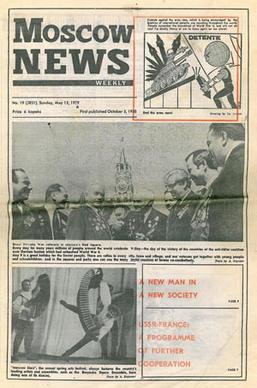Voice of Russia, commonly abbreviated VOR, was the Russian government's international radio broadcasting service from 1993 until 2014, when it was reorganised as Radio Sputnik. Its interval signal was a chime version of 'Majestic' chorus from the Great Gate of Kiev portion of Pictures at an Exhibition by Mussorgsky.

Moskovskij Komsomolets is a Moscow-based daily newspaper with a circulation approaching one million, covering general news. Founded in 1919, it is famed for its topical reporting on Russian politics and society.

The Moscow News, which began publication in 1930, was Russia's oldest English-language newspaper. Many of its feature articles used to be translated from the Russian language Moskovskiye Novosti.
Vremya Novostei was a Russian business socio-political daily newspaper based in Moscow.

Moskovskiye Vedomosti was Russia's largest newspaper by circulation before it was overtaken by Saint Petersburg dailies in the mid-19th century.
RIA Novosti, sometimes referred to as RIAN (РИАН) or RIA (РИА), is a Russian state-owned domestic news agency. On 9 December 2013, by a decree of Vladimir Putin, it was liquidated and its assets and workforce were transferred to the newly created Rossiya Segodnya agency. On 8 April 2014, RIA Novosti was registered as part of the new agency.

The Mayor of Moscow is the head and the highest-ranking official of Moscow, who leads the Government of Moscow, the main executive body of the city.
Lenta.ru is a Russian-language online newspaper. Based in Moscow, it is owned by Rambler Media Group. In 2013, the Alexander Mamut-owned companies "SUP Media" and "Rambler-Afisha" merged to form "Afisha.Rambler.SUP", which owns Lenta.ru. The online newspaper is one of the most popular Russian language online resources with over 600 thousand visitors daily.

Television, magazines, and newspapers have all been operated by both state-owned and for-profit corporations which depend on advertising, subscription, and other sales-related revenues. Even though the Constitution of Russia guarantees freedom of speech, the press has been plagued by both government censorship and self-censorship.

MIA Rossiya Segodnya is a media group owned and operated by the Russian government, created on the basis of RIA Novosti. The group owns and operates Sputnik, RIA Novosti, inoSMI and several other entities. The head of the organisation is Dmitry Kiselyov. Margarita Simonyan is the chief editor.

The Lame Horse fire occurred on 5 December 2009, around 01:00 local time in the nightclub Khromaya Loshad at 9 Kuybyshev Street, Perm, Russia. The fire started when sparks from pyrotechnics ignited the low ceiling and its willow twig covering. The fire quickly spread to the walls and damaged the building's electrical wiring, causing the lights to fail. This is a dual fireworks accident and nightclub fire.

Svetlana Vasiliyevna Mironyuk is a Russian top manager who is currently a Professor of Business Practice, Innovation catalyst and Dean for Operations and Digital at SKOLKOVO School of Management. Former media executive, head and editor-in-chief of the RIA Novosti news agency, having been appointed chair of the board in 2003 and director general in 2004. A graduate of Moscow State University.

The 2013 Moscow mayoral election was held on September 8, 2013, as part of the regional elections, at the same time as the elections in Moscow Oblast and other Oblasts were held.

Dmitry Konstantinovich Kiselyov is a Russian TV presenter and propagandist. In 2013, Kiselyov was appointed by Russian President Vladimir Putin to head Rossiya Segodnya, a Russian state-controlled media group. He also serves as deputy director of the All-Russia State Television and Radio Broadcasting Company.

In 2010, after the long-standing mayor of Moscow Yuri Luzhkov's resignation, then-President of Russia Dmitry Medvedev appointed Sergey Sobyanin for a five-year term. After the protests sparked in December 2011, Medvedev responded to that by a series of measures supposed to make political power more dependent on voters and increase accessibility for parties and candidates to elections; in particular, he called for re-establishing elections of heads of federal subjects of Russia, which took effect on June 1, 2012. On February 14, 2013, Sobyanin declared the next elections would be held in 2015, and a snap election would be unwanted by Muscovites, and on March 1, he proclaimed he wanted to run for a second term as a mayor of Moscow in 2015.

Vladimir Yakovlevich Tsvetov was an International observer, TV commentator, orientalist, japanist. Son of the writer, poet and journalist Yakov Tsvetov (Tseitlin) (1909-1977).

Vyacheslav Mikhailovich Markhayev is a Russian politician who is currently a member of parliament, a deputy of the State Duma since 2021, as he already served a member of the State Duma elected in 2011.
Alexey Andreevich Kovalev is a Russian journalist, translator, media manager and commentator. He is former the head of investigative desk at Meduza, former editor-in-chief of Russian Coda Media and former editor-in-chief of inoSMI.
"What Russia Should Do with Ukraine", is an article written by Timofey Sergeytsev and published by the Russian state-owned news agency RIA Novosti. The article calls for the full destruction of Ukraine as a state, as well as the full destruction of the Ukrainian national identity in accordance with Russia's aim to accomplish the "denazification" of the latter.
Igor Anatolyevich Guzhva is a Ukrainian journalist, commentator, television host, and editor-in-chief of the website Strana.ua. From 2013 until July 29, 2015, he was the owner and leader of the media holding Multimedia Invest Group. Since October 1, 2018, he has been a political refugee in the European Union (Austria).












